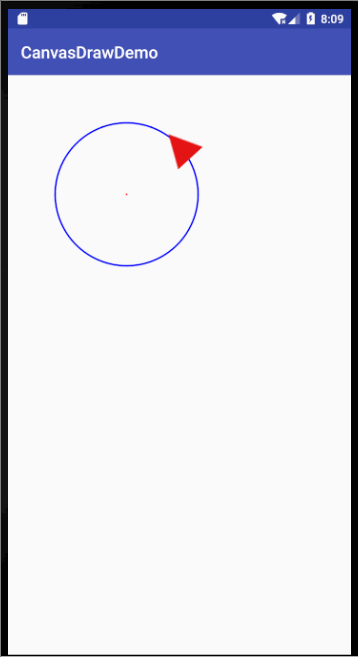Android 绘图学习
android绘图之Paint(1)
android绘图之Canvas基础(2)
Android绘图之Path(3)
Android绘图之drawText绘制文本相关(4)
Android绘图之Canvas概念理解(5)
Android绘图之Canvas变换(6)
Android绘图之Canvas状态保存和恢复(7)
Android绘图之PathEffect (8)
Android绘图之LinearGradient线性渐变(9)
Android绘图之SweepGradient(10)
Android绘图之RadialGradient 放射渐变(11)
Android绘制之BitmapShader(12)
Android绘图之ComposeShader,PorterDuff.mode及Xfermode(13)
Android绘图之drawText,getTextBounds,measureText,FontMetrics,基线(14)
Android绘图之贝塞尔曲线简介(15)
Android绘图之PathMeasure(16)
Android 动态修改渐变 GradientDrawable
1 PathMeasure概述
首先思考一个问题,任意绘制一条曲线,或者一个圆弧,或者一个不规则图形,又或者利用Path 同时绘制多条曲线,如何获取某个点的坐标,曲线的方向,对于简单的图形根据已知内容很容易得到坐标,对于类似贝塞尔曲线或者不规则图形想要或者坐标,角度信息很困难,今天就来讲解Path中用于获取上述信息的一个工具类。
PathMeasure是一个用来测量Path的工具类,可以从Path中获取固定位置的坐标,横切信息。
构造函数:
/**
* Create an empty PathMeasure object. To uses this to measure the length
* of a path, and/or to find the position and tangent along it, call
* setPath.
*/
public PathMeasure() ;
/**
* Create a PathMeasure object associated with the specified path object
* (already created and specified). The measure object can now return the
* path's length, and the position and tangent of any position along the
* path.
*
* Note that once a path is associated with the measure object, it is
* undefined if the path is subsequently modified and the the measure object
* is used. If the path is modified, you must call setPath with the path.
*
* @param path The path that will be measured by this object
* @param forceClosed If true, then the path will be considered as "closed"
* even if its contour was not explicitly closed.
*/
public PathMeasure(Path path, boolean forceClosed) ;
主要有两个构造函数:
PathMeasure()
无参构造函数,构造一个空的PathMeasure,想要使用必须和一个Path进行关联,可以利用setPath函数和Path设置关联。如果关联的Path被修改了,也需要重新调用setPath进行关联。
PathMeasure(Path path, boolean forceClosed)
参数说明:
path:关联的Path,如果想要重新关联新的path,可以调用函数setPath
forceClosed:设置测量Path时是否强制闭合path(有的Path不是闭合的,如果为true,那么测量时就会测量闭合的path,所以使用时要注意,forceClose为true时测量的长度可能更大。如果关联的Path被修改了,也需要重新调用setPath进行关联。
所以可以得出:
设置关联的Path之后,Path就不会再修改,就算原Path修改了,引用的Path也不会修改,想要应用原Path的修改就需要重新setPath。
forceClosed 代码示例
public class ViewDemo25 extends View {
private Path mPath;
private Paint mPaint1;
private Paint mPaint2;
public ViewDemo25(Context context) {
this(context,null,0);
}
public ViewDemo25(Context context, @Nullable AttributeSet attrs) {
this(context, attrs,0);
}
public ViewDemo25(Context context, @Nullable AttributeSet attrs, int defStyleAttr) {
super(context, attrs, defStyleAttr);
init();
}
private void init() {
mPaint1 = new Paint(Paint.ANTI_ALIAS_FLAG);
mPaint1.setStrokeWidth(7);
mPaint1.setStyle(Paint.Style.STROKE);
mPaint1.setColor(Color.RED);
mPaint2 = new Paint(Paint.ANTI_ALIAS_FLAG);
mPaint2.setStrokeWidth(7);
mPaint2.setColor(Color.RED);
mPath = new Path();
mPath.moveTo(100,100);
mPath.lineTo(600,300);
mPath.lineTo(300,500);
PathMeasure pathMeasure1 = new PathMeasure(mPath, true);
PathMeasure pathMeasure2 = new PathMeasure(mPath, false);
System.out.println("===========pathMeasure1========"+pathMeasure1.getLength());
System.out.println("===========pathMeasure2========"+pathMeasure2.getLength());
}
@Override
protected void onMeasure(int widthMeasureSpec, int heightMeasureSpec) {
super.onMeasure(widthMeasureSpec, heightMeasureSpec);
}
@Override
protected void onDraw(Canvas canvas) {
super.onDraw(canvas);
canvas.drawPath(mPath,mPaint1);
}
}
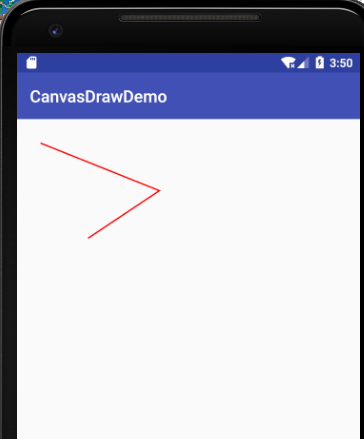
结果值:
===pathMeasure11346.2852
===pathMeasure2899.0716
Path是个非闭合曲线,forceClose为true获取到的Path长度明显大于forceClose为flase时的值。
2 PathMeasure 方法说明
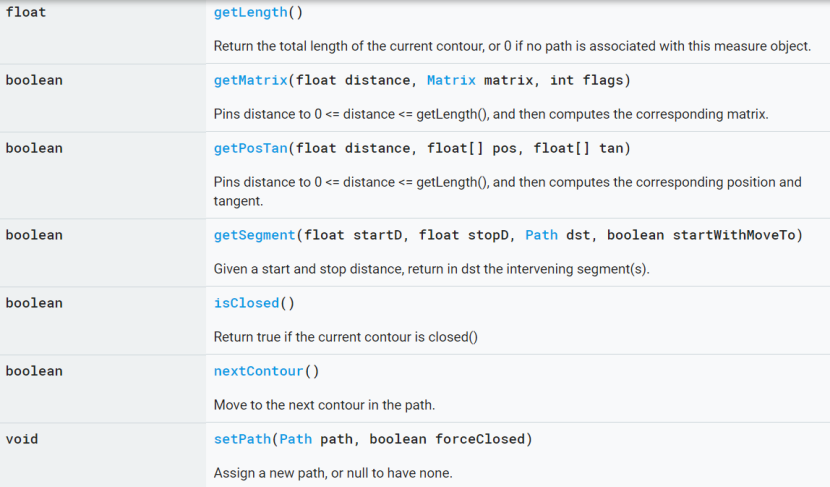
- getLength: 用于获取 Path 的总长度,
- getMatrix(float distance,Matrix matrix,int flags):获取指定长度的位置(distance)坐标及该点Matrix
- getPosTan(float distance,float[] pos,float[] tan):获取指定位置的坐标和tan值,tan值代表曲线方向,也就是切线值,
- getSegment(float startD,float stopD,Path dst,boolean startWithMoveTo):获取两点之间的path片段,
- setPath 设置 PathMeasure 与 Path 关联。
- isClosed :用于判断 Path 是否闭合,但需要注意一点,它不单单指Path本身的闭合,还指如果 关联 Path 的时候设置 forceClosed 为 true 的话,方法也返回true。
- nextContour():获取下一条曲线的Path,因为Path可能包含多个相互之间不连接的Path。
3 setpath(Path path ,boolean forceClosed)
设置PathMeasure关联的Path,如果已设置的Path改变了,需要重新调用setPath,已设置的Path不会更新。
forceClosed:设置测量Path时是否强制闭合path(有的Path不是闭合的,如果为true,那么测量时就会测量闭合的path,所以使用时要注意,forceClose为true时测量的长度可能更大。
无论传入的forceClosed为true或者false,都不会影响原Path的绘制。
代码示例:
private void init() {
mPaint1 = new Paint(Paint.ANTI_ALIAS_FLAG);
mPaint1.setStrokeWidth(7);
mPaint1.setStyle(Paint.Style.STROKE);
mPaint1.setColor(Color.RED);
mPaint2 = new Paint(Paint.ANTI_ALIAS_FLAG);
mPaint2.setStrokeWidth(7);
mPaint2.setColor(Color.RED);
mPath = new Path();
mPath.moveTo(100,100);
mPath.lineTo(600,300);
mPath.lineTo(300,500);
PathMeasure pathMeasure1 = new PathMeasure();
pathMeasure1.setPath(mPath, true);
PathMeasure pathMeasure2 = new PathMeasure();
pathMeasure2.setPath(mPath, false);
System.out.println("===========pathMeasure1===1111====="+pathMeasure1.getLength());
System.out.println("===========pathMeasure2====2222===="+pathMeasure2.getLength());
mPath.lineTo(200,400);
System.out.println("===========pathMeasure1===33333====="+pathMeasure1.getLength());
System.out.println("===========pathMeasure2====4444===="+pathMeasure2.getLength());
pathMeasure1.setPath(mPath, true);
pathMeasure2.setPath(mPath, false);
System.out.println("===========pathMeasure1===55555====="+pathMeasure1.getLength());
System.out.println("===========pathMeasure2====66666===="+pathMeasure2.getLength());
}
@Override
protected void onDraw(Canvas canvas) {
super.onDraw(canvas);
canvas.drawPath(mPath,mPaint1);
}
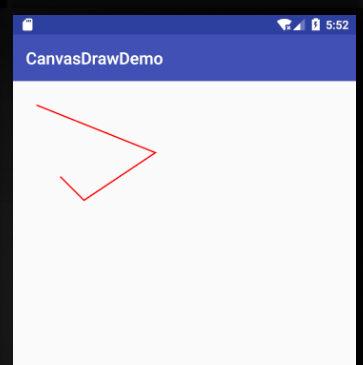
结果:
=====pathMeasure1=1111=1346.2852
===pathMeasure22222899.0716
修改path后没有调用setPath的结果:
=====pathMeasure1=33333=1346.2852
===pathMeasure24444899.0716
修改path后调用setPath的结果:
=====pathMeasure1=55555=1356.7207
===pathMeasure2666661040.4929
上面的例子首先测试了forceClosed 为true和false时的不同,接着测试了在生成PathMeasure实例后,修改关联的Path,再次获取PathMeasure信息,信息没有改变,之后重新调用setPath后,信息才改变。
所以如果测量过程中PathMeasure关联的Path发生改变,需要重新调用setPath方法进行关联。
4 nextContour
/**
* Move to the next contour in the path. Return true if one exists, or
* false if we're done with the path.
*/
public boolean nextContour();
由于后续需要,先讲解nextContour,看到这个函数取下一条曲线,也就是说明了一个Path可以有多条曲线。默认情况 getLength , getSegment 等PathMeasure方法,都只会在其中第一条线段上运行, nextContour 会跳转到下一条曲线到方法,如果跳转成功,则返回 true, 如果跳转失败,则返回 false。
代码示例:
mPath = new Path();
mPath.moveTo(100,100);
mPath.lineTo(600,300);
mPath.lineTo(300,500);
mPath.addRect(400,400,900,900, Path.Direction.CW);
PathMeasure pathMeasure = new PathMeasure();
pathMeasure.setPath(mPath,false);
System.out.println("======getLength1111===="+pathMeasure.getLength());
if (pathMeasure.nextContour()){
System.out.println("======getLength2222===="+pathMeasure.getLength());
}

输出结果:
==getLength1111899.0716
==getLength22222000.0
nextContour()返回true,移动到下一条曲线成功,使PathMeasure的方法作用于第二条曲线上。
5 getLength
/**
* Return the total length of the current contour, or 0 if no path is
* associated with this measure object.
*/
public float getLength()
返回当前轮廓的总长度,根据nextContour()的介绍,知道返回的长度默认只是对第一条曲线的长度的计算。如果想要计算Path中所有曲线的总长度,需要循环调用nextContour,然后计算每条线段的长度,然后相加得到。
6 isClosed
用于判断 Path 是否闭合,但需要注意一点,它不单单指Path本身的闭合,还指如果 关联 Path 的时候设置 forceClosed 为 true 的话,方法也返回true。
mPath = new Path();
mPath.moveTo(100,100);
mPath.lineTo(600,300);
mPath.lineTo(300,500);
mPath.addRect(400,400,900,900, Path.Direction.CW);
PathMeasure pathMeasure = new PathMeasure();
pathMeasure.setPath(mPath,false);
System.out.println("======isclosed111===="+pathMeasure.isClosed());
if (pathMeasure.nextContour()){
System.out.println("======isclosed222===="+pathMeasure.isClosed());
}
setPath是forceClosed传入false,结果为:
==isclosed111false
==isclosed222true
如果forceClosed传入true:
==isclosed111true
==isclosed222true
所以isClosed判断曲线是否闭合受forceClosed的影响。
7 getSegment
getSegment获取Path中的一段Path。
/**
* Given a start and stop distance, return in dst the intervening
* segment(s). If the segment is zero-length, return false, else return
* true. startD and stopD are pinned to legal values (0..getLength()).
* If startD >= stopD then return false (and leave dst untouched).
* Begin the segment with a moveTo if startWithMoveTo is true.
*
* <p>On {@link android.os.Build.VERSION_CODES#KITKAT} and earlier
* releases, the resulting path may not display on a hardware-accelerated
* Canvas. A simple workaround is to add a single operation to this path,
* such as <code>dst.rLineTo(0, 0)</code>.</p>
*/
public boolean getSegment(float startD, float stopD, Path dst, boolean startWithMoveTo) ;
参数说明:
startD,stopD:开始截取和结束截取的位置,两个参数都是距离Path起点的长度。
如果startD 大于stopD直接返回false,如果截取的长度等于0直接返回false,startD和stopD都大于0小于Path的总长度。
dst:如果截取成功,截取到的Path将被加入到dst中,不会影响dst中原有的曲线。
startWithMoveTo:起始点是否使用moveTo,如果startWithMoveTo为true,截取的Path放入dst时将会使用moveto,这样可以保证截取的Path起始点不变化。
返回值:返回true表示截取片段成功,返回false表示不成功,不操作dst。
注意:如果系统版本低于等于4.4,默认开启硬件加速的情况下,更改 dst 的内容后可能绘制会出现问题,请关闭硬件加速或者给 dst 添加一个单个操作,例如: dst.rLineTo(0, 0)
首先测试截取成功,是替换dst,还是把截取到的Path添加到dst中。
原始图形:
private void init() {
mPaint1 = new Paint(Paint.ANTI_ALIAS_FLAG);
mPaint1.setStrokeWidth(7);
mPaint1.setStyle(Paint.Style.STROKE);
mPaint1.setColor(Color.BLUE);
mPaint2 = new Paint(Paint.ANTI_ALIAS_FLAG);
mPaint2.setStrokeWidth(7);
mPaint2.setStyle(Paint.Style.STROKE);
mPaint2.setColor(Color.RED);
dst = new Path();
dst.moveTo(300,500);
dst.lineTo(700,700);
mPath = new Path();
mPath.addRect(200,200,900,900, Path.Direction.CW);
PathMeasure pathMeasure = new PathMeasure();
pathMeasure.setPath(mPath,true);
}
@Override
protected void onDraw(Canvas canvas) {
super.onDraw(canvas);
canvas.drawPath(mPath,mPaint1);
canvas.drawPath(dst,mPaint2);
}
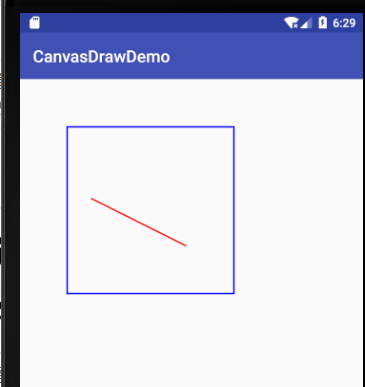
想要截取右下角的Path,示意图如下:
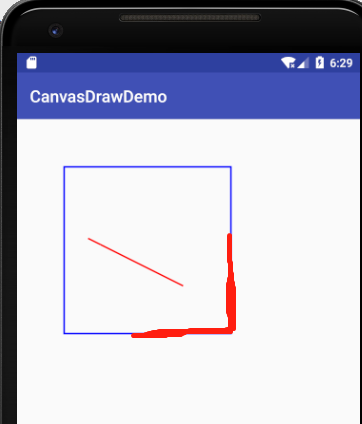
上面的图形是个正方形,开始绘制的点(200,200),每个边长700,所以截取的segment开始点距离Path的开始点为700+350=1050,结束点为1400+350=1750。
private void init() {
mPaint1 = new Paint(Paint.ANTI_ALIAS_FLAG);
mPaint1.setStrokeWidth(7);
mPaint1.setStyle(Paint.Style.STROKE);
mPaint1.setColor(Color.BLUE);
mPaint2 = new Paint(Paint.ANTI_ALIAS_FLAG);
mPaint2.setStrokeWidth(7);
mPaint2.setStyle(Paint.Style.STROKE);
mPaint2.setColor(Color.RED);
dst = new Path();
dst.moveTo(300,500);
dst.lineTo(700,700);
mPath = new Path();
mPath.addRect(200,200,900,900, Path.Direction.CW);
PathMeasure pathMeasure = new PathMeasure();
pathMeasure.setPath(mPath,true);
pathMeasure.getSegment(1050, 1750, dst, true);
}
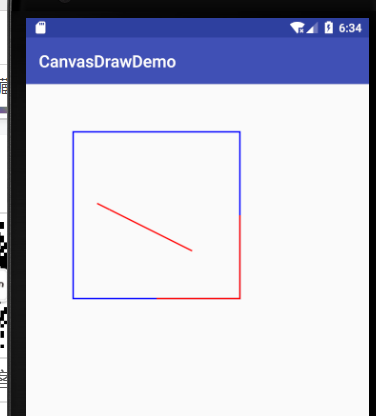
截取成功,然后添加截取到的Path到dst,dst中原来的Path完全没有受影响。
如果设置startWithMoveTo为false:
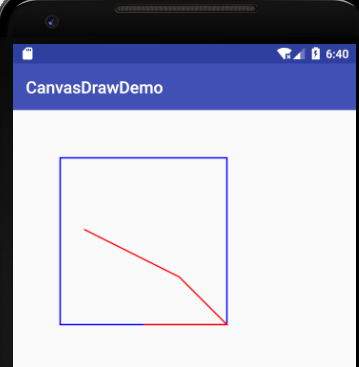
可以看到如果startWithMoveTo 为 false,获取到的segment片段,加入到dst时,会将片段的起始点移动到 dst 的最后一个点,以保证 dst 的连续性,简单点说会忽略截取到的Path的第一个点替换成dst内部已有的最后一个点。
总结:
如果 startWithMoveTo 为 true, 获取到的片段Path会因为调用了moveTo保持原状,如果 startWithMoveTo 为 false,则会将截取出来的 Path 片段的起始点移动到 dst 的最后一个点,以保证 dst 的连续性。
8 getPosTan
/**
* Pins distance to 0 <= distance <= getLength(), and then computes the
* corresponding position and tangent. Returns false if there is no path,
* or a zero-length path was specified, in which case position and tangent
* are unchanged.
*
* @param distance The distance along the current contour to sample
* @param pos If not null, returns the sampled position (x==[0], y==[1])
* @param tan If not null, returns the sampled tangent (x==[0], y==[1])
* @return false if there was no path associated with this measure object
*/
public boolean getPosTan(float distance, float pos[], float tan[])
获取Path路径上距离起点位置distance距离的坐标信息和tan值。
参数说明:
distance:距离Path起点的位置长度,
pos:获取该点的坐标值
tan:改点的正切值,tan0是邻边边长,tan1是对边边长
用ps钢笔工具自己画个箭头。
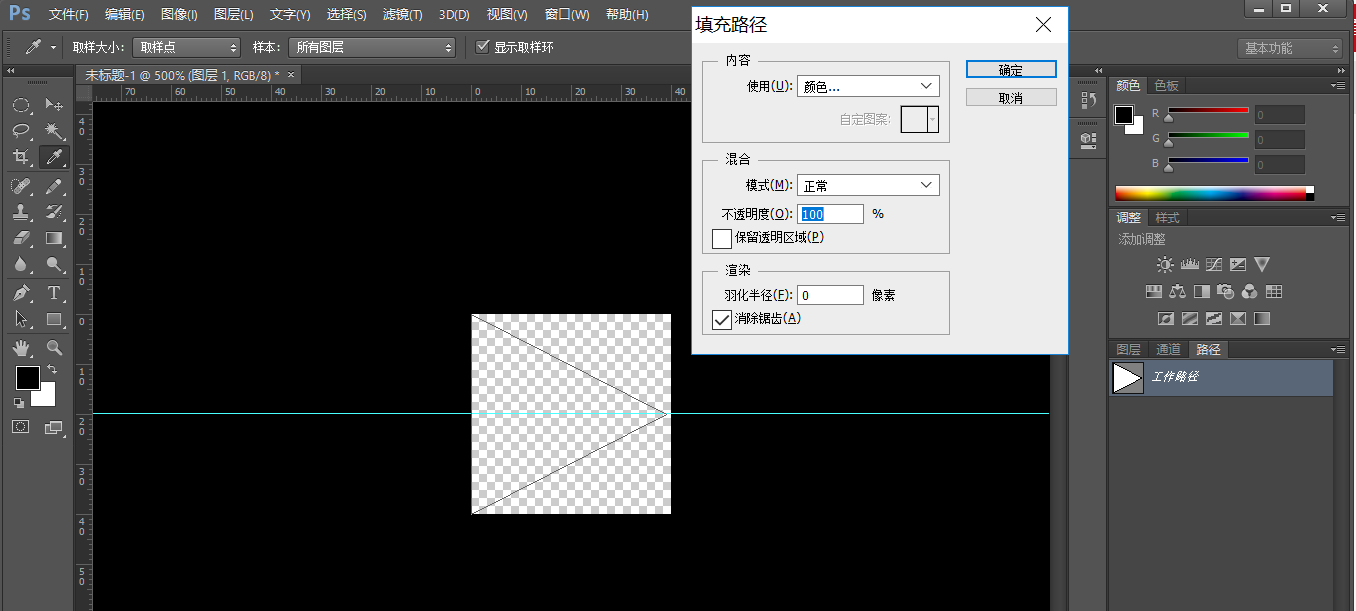
代码示例:
private void init() {
mPaint1 = new Paint(Paint.ANTI_ALIAS_FLAG);
mPaint1.setStrokeWidth(7);
mPaint1.setStyle(Paint.Style.STROKE);
mPaint1.setColor(Color.BLUE);
mPaint2 = new Paint(Paint.ANTI_ALIAS_FLAG);
mPaint2.setStrokeWidth(7);
mPaint2.setStyle(Paint.Style.STROKE);
mPaint2.setColor(Color.RED);
dst = new Path();
dst.moveTo(300,500);
dst.lineTo(700,700);
mPath = new Path();
mPath.addCircle(500,500,300, Path.Direction.CW);
PathMeasure pathMeasure = new PathMeasure();
pathMeasure.setPath(mPath,false);
float zhouchang = (float) (2*Math.PI*300);
System.out.println("=======circle周长========"+ zhouchang);
float[] pos = new float[2];
float[] tan = new float[2] ;
pathMeasure.getPosTan(zhouchang*3/4,pos,tan);
System.out.println("=========pos==========="+pos[0]+" "+pos[1]);
System.out.println("=========tan==========="+tan[0]+" "+tan[1]);
}
@Override
protected void onDraw(Canvas canvas) {
super.onDraw(canvas);
canvas.drawPath(mPath,mPaint1);
canvas.drawPoint(500,500,mPaint2);
}
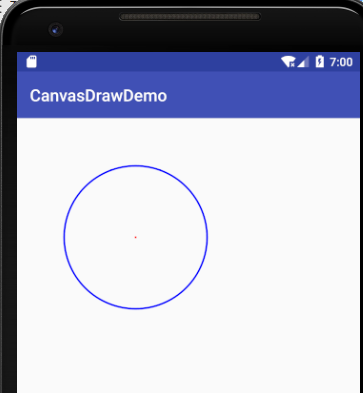
输出结果:有稍微的误差是由于精度问题导致
=circle周长1884.9556
=pos=500.56152 200.00053
=tan===0.9999983 0.0018716537
tan的值有什么用呢,我们可以利用切线值得到当前线段的方向,也就是倾斜的角度。
float degrees = (float) (Math.atan2(tan[1], tan[0]) * 180.0 / Math.PI);
Math中 atan2 可以根据正切值得到角度值(也可以自己计算)弧度,然后将弧度转换为具体的度数。
如果不利用获取到的tan,直接根据坐标点绘制图片
private void init() {
mPaint1 = new Paint(Paint.ANTI_ALIAS_FLAG);
mPaint1.setStrokeWidth(7);
mPaint1.setStyle(Paint.Style.STROKE);
mPaint1.setColor(Color.BLUE);
mPaint2 = new Paint(Paint.ANTI_ALIAS_FLAG);
mPaint2.setStrokeWidth(7);
mPaint2.setStyle(Paint.Style.STROKE);
mPaint2.setColor(Color.RED);
dst = new Path();
dst.moveTo(300,500);
dst.lineTo(700,700);
jiantou = BitmapFactory.decodeResource(getResources(),R.drawable.jiantou);
mPath = new Path();
mPath.addCircle(500,500,300, Path.Direction.CW);
final PathMeasure pathMeasure = new PathMeasure();
pathMeasure.setPath(mPath,false);
final float zhouchang = (float) (2*Math.PI*300);
System.out.println("=======circle周长========"+ zhouchang);
float[] pos = new float[2];
float[] tan = new float[2] ;
pathMeasure.getPosTan(zhouchang*3/4,pos,tan);
System.out.println("=========pos==========="+pos[0]+" "+pos[1]);
System.out.println("=========tan==========="+tan[0]+" "+tan[1]);
ValueAnimator valueAnimator = ValueAnimator.ofFloat(0,zhouchang);
valueAnimator.setDuration(10000);
valueAnimator.setInterpolator(new LinearInterpolator());
valueAnimator.setRepeatCount(-1);
valueAnimator.addUpdateListener(new ValueAnimator.AnimatorUpdateListener() {
@Override
public void onAnimationUpdate(ValueAnimator animation) {
float correntLen = (float) animation.getAnimatedValue();
float[] pos = new float[2];
float[] tan = new float[2] ;
pathMeasure.getPosTan(correntLen,pos,tan);
posX = pos[0];
posY = pos[1];
invalidate();
}
});
valueAnimator.start();
}
@Override
protected void onDraw(Canvas canvas) {
super.onDraw(canvas);
canvas.drawPath(mPath,mPaint1);
canvas.drawPoint(500,500,mPaint2);
canvas.drawBitmap(jiantou,posX,posY,mPaint2);
}
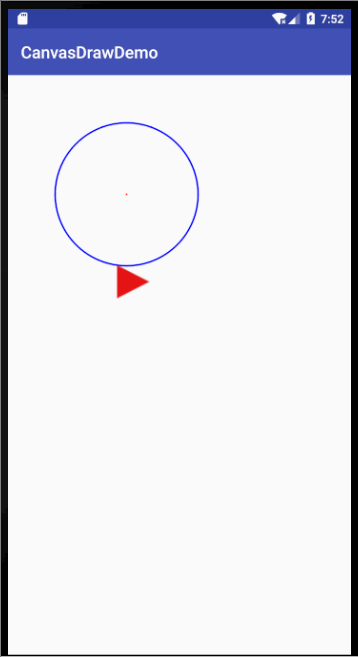
图片从左上角开始绘制,左上角会沿着坐标旋转,看着很不舒服。
对图片进行操作:
利用获取的tan值对图片进行旋转和平移操作,注意这里的旋转操作时建立在图片的初始箭头方向为水平向右的,如果水平向左,则计算图片旋转方向时时不相同的(和绘制方向无关)。
private void init() {
mPaint1 = new Paint(Paint.ANTI_ALIAS_FLAG);
mPaint1.setStrokeWidth(7);
mPaint1.setStyle(Paint.Style.STROKE);
mPaint1.setColor(Color.BLUE);
mPaint2 = new Paint(Paint.ANTI_ALIAS_FLAG);
mPaint2.setStrokeWidth(7);
mPaint2.setStyle(Paint.Style.STROKE);
mPaint2.setColor(Color.RED);
dst = new Path();
dst.moveTo(300,500);
dst.lineTo(700,700);
mMatrix = new Matrix();
jiantou = BitmapFactory.decodeResource(getResources(),R.drawable.jiantou);
mPath = new Path();
mPath.addCircle(500,500,300, Path.Direction.CCW);
final PathMeasure pathMeasure = new PathMeasure();
pathMeasure.setPath(mPath,false);
final float zhouchang = (float) (2*Math.PI*300);
System.out.println("=======circle周长========"+ zhouchang);
float[] pos = new float[2];
float[] tan = new float[2] ;
pathMeasure.getPosTan(zhouchang*3/4,pos,tan);
System.out.println("=========pos==========="+pos[0]+" "+pos[1]);
System.out.println("=========tan==========="+tan[0]+" "+tan[1]);
ValueAnimator valueAnimator = ValueAnimator.ofFloat(0,zhouchang);
valueAnimator.setDuration(10000);
valueAnimator.setInterpolator(new LinearInterpolator());
valueAnimator.setRepeatCount(-1);
valueAnimator.addUpdateListener(new ValueAnimator.AnimatorUpdateListener() {
@Override
public void onAnimationUpdate(ValueAnimator animation) {
float correntLen = (float) animation.getAnimatedValue();
float[] pos = new float[2];
float[] tan = new float[2] ;
pathMeasure.getPosTan(correntLen,pos,tan);
posX = pos[0];
posY = pos[1];
mMatrix.reset();
//得到当前坐标的方向趋势对应的角度
float degrees = (float) (Math.atan2(tan[1], tan[0]) * 180.0 / Math.PI);
//下面两个比较重要,以图片中心为旋转点对图片进行旋转,把图片中心平移到Path上
mMatrix.postRotate(degrees, jiantou.getWidth() / 2, jiantou.getHeight() / 2);
mMatrix.postTranslate(pos[0] - jiantou.getWidth() / 2, pos[1] - jiantou.getHeight() / 2);
invalidate();
}
});
valueAnimator.start();
}
@Override
protected void onDraw(Canvas canvas) {
super.onDraw(canvas);
canvas.drawPath(mPath,mPaint1);
canvas.drawPoint(500,500,mPaint2);
canvas.drawBitmap(jiantou,mMatrix,mPaint2);
}
}
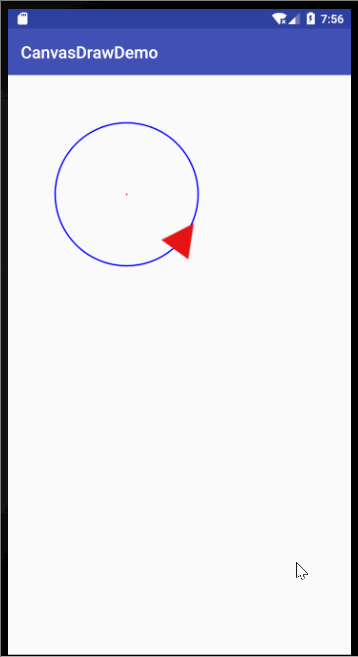
9 getMatrix
/**
* Pins distance to 0 <= distance <= getLength(), and then computes the
* corresponding matrix. Returns false if there is no path, or a zero-length
* path was specified, in which case matrix is unchanged.
*
* @param distance The distance along the associated path
* @param matrix Allocated by the caller, this is set to the transformation
* associated with the position and tangent at the specified distance
* @param flags Specified what aspects should be returned in the matrix.
*/
public boolean getMatrix(float distance, Matrix matrix, int flags)
上面的例子利用getPosTan获取正切值,然后计算位置和旋转角度过程很麻烦,所以google提供了getmatrix直接获取变换后的Matrix矩阵供我们使用。
参数说明:
distance:距离Path起始点的距离
matrix:得到的matrix矩阵
flags:规定哪些信息添加到Matrix中,flags有两个值POSITION_MATRIX_FLAG,TANGENT_MATRIX_FLAG。POSITION_MATRIX_FLAG表示把位置信息添加到matrix中,TANGENT_MATRIX_FLAG表示把正切信息添加到matrix中。
可以分别添加POSITION_MATRIX_FLAG和TANGENT_MATRIX_FLAG,如果想同时添加这两者需要POSITION_MATRIX_FLAG|TANGENT_MATRIX_FLAG。
利用getMatrix实现箭头功能。
valueAnimator.addUpdateListener(new ValueAnimator.AnimatorUpdateListener() {
@Override
public void onAnimationUpdate(ValueAnimator animation) {
float correntLen = (float) animation.getAnimatedValue();
float[] pos = new float[2];
float[] tan = new float[2] ;
pathMeasure.getPosTan(correntLen,pos,tan);
mMatrix.reset();
pathMeasure.getMatrix(correntLen,mMatrix,PathMeasure.TANGENT_MATRIX_FLAG|PathMeasure.POSITION_MATRIX_FLAG);
//矩阵对旋转角度默认为图片的左上角,使用 preTranslate 调整原点为图片中心
mMatrix.preTranslate(-jiantou.getWidth() / 2, -jiantou.getHeight() / 2);
invalidate();
}
});
